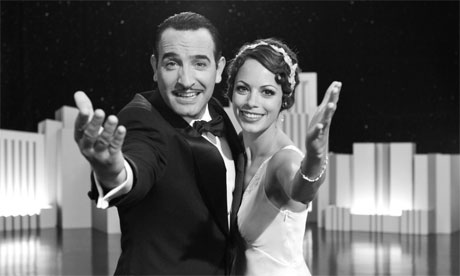
Until yesterday, a British contender – Lynne Ramsay, with We Need to Talk About Kevin – seemed to be cantering ahead in the race for the Palme d'Or. But now Terrence Malick has shot out of the starting gate with The Tree of Life – and yet another film, in my view, is galloping ahead. Frenchman Michel Hazanavicius's glorious picture The Artist is a formally daring and sublimely funny movie about the end of silent movies in 1920s Hollywood. It is itself silent and in black and white, with inter-titles and a full, continuous orchestral score. Endlessly inventive, packed with clever sight-gags and rich in stunningly achieved detail, The Artist is a pastiche and a passionate love letter to the silent age; it takes the silent movie seriously as a specific form, rather than as obsolete technology, and sets out to create a new movie within the genre.
The star is Jean Dujardin, chiefly known for his spy-spoof comedies. He plays George Valentin, a sleekly handsome star whose career comes to a crunching end with the coming of the talkies. Dujardin's cat-that-got-the-cream smirk and his sleek good looks suggest not merely the Gene Kelly of Singin' in the Rain, but Maurice Chevalier. As Valentin becomes yesterday's man in yesterday's movies, his former co-star Peppy Miller (Bérénice Bejo) is storming to stardom; her soaring status and his falling star means that the budding romance between them is doomed never to flower. His pride is too badly injured, and Peppy (sensitive and intuitive, where he is self-absorbed) is all too aware of the fact.
The Artist is tender, touching and never makes the mistake of simply sending itself up. The performances from Dujardin and Bejo are tremendous, with great support from two bona fide Americans: James Cromwell as Valentin's loyal chauffeur, and John Goodman as the glowering producer. The happy ending had me on my feet cheering throughout the final credits. I can't wait to see it again.
There is little in the way of cheering and laughs in Michael, from first-time director Markus Schleinzer, an icily austere Austrian movie in the manner of Michael Haneke (Schleinzer worked on many of Haneke's films as a casting director). The film is about the drab and not especially dramatic day-to-day life of a paedophile, who keeps a 10-year-old boy locked up in his cellar. Evidently inspired by the Fritzl and Kampusch cases, the movie is made with severity and purpose, though this could be a film that is telling us something we knew already.
Joseph Cedar's Israeli movie Footnote is a sprightly, shrewd and ingenious black comedy of middle age and disappointed ambition, which some have sniffed at for being middleweight entertainment. For me, it was an elegant literary diversion, with something of Nabokov or the English campus comedies of David Lodge and Malcolm Bradbury. There was also some nifty storytelling – sometimes a rarity in the Cannes competition – and it was let down only by one untied plot strand that may have been lost in the edit.
The film stars Shlomo Bar-Aba as the elderly Talmudic scholar Professor Eliezer Shkolnik, a philologist and unfashionable textual specialist whose long career has never been rewarded with any of the prestigious prizes and academic positions he longs for; instead, he is known solely for having been flatteringly mentioned, as a young man, in a single footnote by a far greater scholar.
To Shkolnik's chagrin, his middle-aged son – Professor Uriel Shkolnik (Lior Ashkenazi), also a Talmudic specialist – has been showered with all the awards and fellowships that he himself yearned for, having industriously turned out a trendier, cultural-studies-type of relativist criticism, the sort of work Shkolnik despises as lacking in rigour and objectivity.
The son's career triumph over the father is an intensely painful subject neither can acknowledge: the younger man is genuinely angry at the academic world's treatment of his father, and yet also angry at the harsh way this man treated him as a boy. The older man must now reconcile himself to being a footnote in his son's life; he deals with this by retreating into a cantankerous, depressive silence. Then, one day, a sensational piece of news turns everything upside down.
Although arguably a slightly mannered film, this has something that audiences yearn for, whether at festivals or the multiplex: a really good story. It may not get a prize, and there will be many who think that Israeli films are only admissible if they address the Palestinian issue, but Cedar's film more than justified its inclusion.

